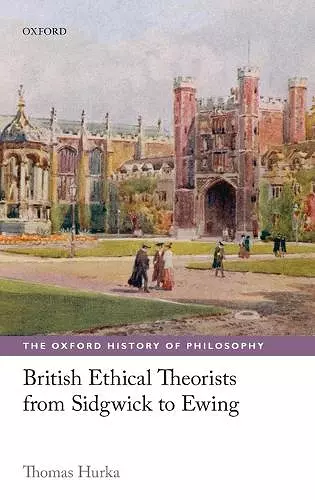British Ethical Theorists from Sidgwick to Ewing
Format:Hardback
Publisher:Oxford University Press
Published:6th Nov '14
Currently unavailable, and unfortunately no date known when it will be back
This hardback is available in another edition too:
- Paperback£29.99(9780198801528)

Thomas Hurka presents the first full historical study of an important strand in the development of modern moral philosophy. His subject is a series of British ethical theorists from the late nineteenth century to the mid-twentieth century, who shared key assumptions that made them a unified and distinctive school. The best-known of them are Henry Sidgwick, G. E. Moore, and W. D. Ross; others include Hastings Rashdall, H. A. Prichard, C. D. Broad, and A. C. Ewing. They disagreed on some important topics, especially in normative ethics. Thus some were consequentialists and others deontologists: Sidgwick thought only pleasure is good while others emphasized perfectionist goods such as knowledge, aesthetic appreciation, and virtue. But all were non-naturalists and intuitionists in metaethics, holding that moral judgements can be objectively true, have a distinctive subject-matter, and are known by direct insight. They also had similar views about how ethical theory should proceed and what are relevant arguments in it; their disagreements therefore took place on common ground. Hurka recovers the history of this under-appreciated group by showing what its members thought, how they influenced each other, and how their ideas changed through time. He also identifies the shared assumptions that made their school unified and distinctive, and assesses their contributions critically, both when they debated each other and when they agreed. One of his themes is that that their general approach to ethics was more fruitful philosophically than many better-known ones of both earlier and later times.
This is a remarkable book. Thomas Hurka offers us an extraordinarily rich account of the views of a century of British moral philosophers ... he also offers characteristically forceful assessments of who was right and which changes of view were for the better and which for the worse ... Hurka's book is a wonderful resource. The index alone is amazing. * Jonathan Dancy, Notre dame Philosophical Reviews *
Hurka's study is a valuable contribution to the literature and will surely succeed in stimulating more discussion of this period of moral philosophy ... Highly Recommended. * Choice *
An absolutely marvelous book: chock-full of interesting discussions of philosophically important ideas of a group of relatively neglected philosophers who deserve to be much better known. Hurka writes with enviable acuity, efficiency, and flair. And he makes a convincing case that these figures constitute a golden age of British ethical philosophy ... filled with wonderfully interesting philosophy, both the school's and Hurka's, presented with great clarity and lively and masterful prose. It is an important book, both for the light it sheds on this rich philosophical period and for the significance the school's ideas have for continuing debates today. I could not recommend it more highly. * Stephan Darwall, Ethics *
The quality of scholarship is tremendously high ... Hurka's book leaves no doubt that the school from Sidgwick to Ewing marks a peak in the history of moral philosophy. ... Every moral philosopher should read it. * Jonas Olson, Utilitas *
The value of this book ... is immense. The penetrating discussions of such matters as Ross's different formulations of his position on prima facie duties, of the Broad-Ewing defence of 'fittingness' as the fundamental thin moral concept, ... and so on and on are deft, scholarly, and wonderfully informative. * Bart Schultz, Australasian Journal of Philosophy *
ISBN: 9780199233625
Dimensions: 241mm x 162mm x 24mm
Weight: 654g
326 pages